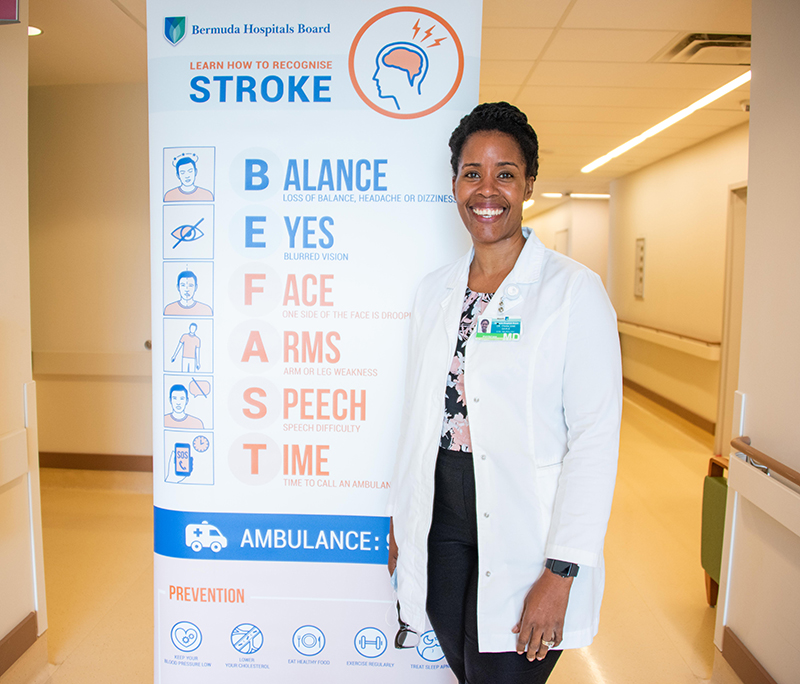BHB: Improved Care For Stroke Patients
Stroke care in Bermuda has “dramatically improved since the establishment of Bermuda Hospitals Board’s [BHB] Primary Stroke Centre in July 2019, part of a clinical affiliation with Johns Hopkins Medicine International,” BHB said.
A spokesperson said, “Establishing a Primary Stroke Centre has led to improvements to processes and treatments within the hospital. These clinical improvements, alongside a public awareness campaign about the importance of seeking immediate emergency care at the first signs of stroke, have meant more people get the critical care they need in time to improve their outcome.
“About 13% percent of those who experience a stroke now receive a clot-busting drug that increases their chances of making full recoveries, a benchmark that puts BHB’s Stroke Centre in line with outcomes at leading hospitals and stroke facilities around the world. This compares to an average of 7% for primary stroke centres in the USA, with an accepted minimum being 5%.”
“This has immediate human impact,” said Medical Director of the BHB Primary Stroke Centre, Dr Francene Gayle. “It means more of our stroke patients than ever before are able to make full recoveries.
“Three months after having a stroke they are able to return to their pre-stroke functioning levels. This is so important for quality of life, and as 25% of those who had a stroke in 2020 in Bermuda were under the age of 60, these are often people with many years ahead of them.”
“Recognising that stroke had become an epidemic on the island, in 2018 BHB took action to turn the tide. Stroke can be debilitating, leaving individuals paralysed and/or significantly impaired. It is also leading cause of death globally.
“Major disability and death are the common consequences of those with a diagnosis of a stroke globally and Bermuda was no exception” said Dr Gayle. “Those who survive are often unable to return to work or their routine way of living. These individuals were oftentimes the bread winners of their households, and required 24-hour care. The financial impact on the families involved and on the local economy was significant,” Dr Gayle continued.
“We needed to change the trajectory of the trend,” she added. “We wanted to create a Primary Stroke Centre to increase and improve the access of all Bermudians to high-level acute stroke care that’s based on the latest research.
“There are two types of strokes: ischemic and haemorrhagic. The most common are ischemic and involve a restriction in blood supply and therefore oxygen, to the brain. This can be caused by a blood clot or plaque build-up in the arteries.
“In an ischemic stroke, patients who access medical treatment within 4.5 hours of the start of symptoms may be suitable to get a clot-busting medication – called IV thrombolysis tPA [IV tPA]. In cases where this medication is given in time and bursts the clot, the patient avoids the major damaging effects of having a stroke and increases their chance of recovering with little or no disability.
“This clot-busting drug is integral to the process of full stroke recovery,” said Dr Gayle. “But I can’t stress enough the importance of recognising the signs and getting to the hospital immediately. We have to work together to get IV tPA going within that 4.5 hour window. Remember BEFAST—Balance, Eyes, Face, Arm, Speech, Time. If you think you’ve had a stroke, get to hospital immediately, or call 911.”
“We are thrilled to see the improvement in stroke outcomes take place so quickly,” said Victor Urrutia, MD, Director of Johns Hopkins Hospital’s Comprehensive Stroke Center. “It is a clear indication that collaborations like ours can have a significant impact on the health and stability of individuals, families and communities around the world. We will continue to work closely with BHB to assist in their efforts to reduce the incidence and improve stroke outcomes for Bermudians.”
“We have surpassed our goal and we’re now meeting the benchmark of leading hospitals around the world,” said BHB CEO & President Michael Richmond, MD. “But most importantly, we’re improving quality care and changing lives.”



